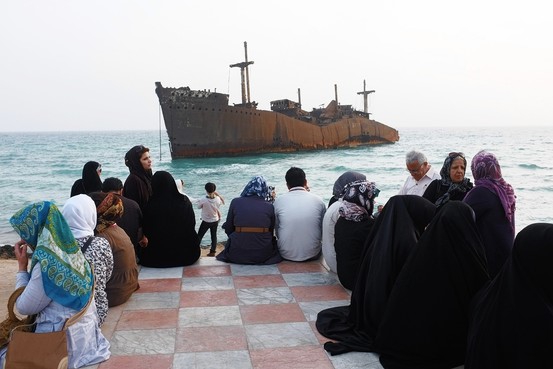 Families enjoy a sunset and the view of a Greek shipwreck on Kish, an island designated a free-trade zone to attract tourists and businesses. Getty Images[/caption]
Families enjoy a sunset and the view of a Greek shipwreck on Kish, an island designated a free-trade zone to attract tourists and businesses. Getty Images[/caption]KISH ISLAND, Iran�A trade show on this Iranian resort island in the Persian Gulf underscores the challenges facing businesses hoping to re-engage with the world after the easing of sanctions.
The International Energy Exhibition, held over four days last month, was decidedly un-international: One Italian executive mingled with mostly Iranian exhibitors, many of whom were trying to buy or sell Western-made oil-field equipment.
"It's just us Iranians," said one exhibitor. "There's hardly any foreigners."
Much of the equipment on display was obtained in violation of international sanctions, so it commanded exorbitant prices, having made its way through various countries to get to Kish. The sanctions initially targeted Iran's nuclear program but have been broadened to include the oil-and-gas industry�its most vital economic sector. The measures remain in place despite a temporary easing of other sanctions, such as tanker insurance and petrochemical exports.
Iran designated Kish a free-trade zone in 1989�with tax exemptions and a visa waiver for tourists and businessmen�as it was seeking foreign investment after its long war with Iraq.
The island is Iran's answer to a Disney resort. It is dotted with American-inspired shopping malls, rococo-style beach hotels, mock palaces and an amusement park featuring dolphin shows. The result is a mixture of Islamic conservatism and freewheeling Dolce Vita. Landing from nearby Dubai, Filipino visitors slip a black robe over their skimpy tops. Mannequins in shops wear fluorescent green veils, while families jet ski, and white stretch limousines cruise the streets.
In recent years, Kish has also served as a meeting place for Iranian businessmen and a dwindling pool of regional suppliers and distributors courageous enough to deal with them amid global sanctions. The recent conference provided Iranian oil executives a chance to trade in rare Western-made gear.
Nima Jalali, a manager at Iranian equipment distributor Sarzamine Nilgone Aria, displayed a 7-inch drill bit manufactured by a unit of Houston-based�National Oil Well Varco�Inc.�NOV�+1.36%
Mr. Jalali said the equipment had been purchased from an Iraqi reseller at a cost of about $60,000�three times the market price outside Iran. He said he intended to sell it to a local oil company. The drill bit arrived in Kish despite a U.S. ban on exporting oil equipment to Iran. Iran considers that ban illegal.
Mr. Jalali declined to comment on whether the equipment was purchased in violation of international sanctions.
Western companies have long said they can't control where their products end up.
National Oil Well didn't return calls seeking comment.
A few aisles down, Saeed Faree, who works with distributor Kia Generator Pouya, displayed a power generator manufactured by�Cummins�Inc.�CMI�+2.71%�of Columbus, Ind. The company is unrelated to Kia of South Korea.
"We cannot buy it [directly] but we have a company abroad" tasked with buying the equipment on its behalf, Mr. Faree said. He wouldn't identify the company.
A spokesman for Cummins said, "We have not sold to Iran since 2008, and there is a quite a bit of counterfeiting and unauthorized activities occurring there." The spokesman added, "We ban all sales of our products to Iran." He said the company could not verify whether the product seen by The Wall Street Journal was "our product or a counterfeit."
Abbas Khanfari, a managing director at Aco Pars Petroleum Kish, an oil-services contractor, displayed a well-hole casing made by Canada's�McCoy�Corp.�MCB.T�+1.42%His deputy, Reza Morovatdar, said the equipment traveled by ship through four other countries before arriving in Iran from Dubai. He declined to be more specific.
McCoy's chief executive, Jim Rakievich, declined to comment.
Mr. Jalali said he also has an inventory of highly sought-after drill bits made by Houston-based�Halliburton�Co.�HAL�+2.38%�Historically one of the most popular brands in the Iranian oil industry, the U.S. company pulled out in 2005. Mr. Jalali said his company managed to find a reseller who had four-year-old gear stored in Dubai.
The lubricants used in the bits had lost much of their effectiveness, he said, but buying a more recent model would have cost five times the international market price.
A Halliburton spokeswoman said the company "does not conduct business in or with Iran."
Iranian oil professionals here said they hoped the black-market atmosphere might be a thing of the past, now that sanctions have been eased.
Sanctions relief so far doesn't include oil-field equipment, but Western powers could ease sanctions further in six months.
Shahab Babayan, a director at oil equipment distributor Middle East Pars Co., had just signed a deal to buy and manufacture oil-refinery equipment from the exhibit's lone European executive, who represents a small Italian manufacturer.
"In a year, the political situation will be sorted," Mr. Babayan said.
By The Wall Street Journal
The Iran Project is not responsible for the content of quoted articles.











